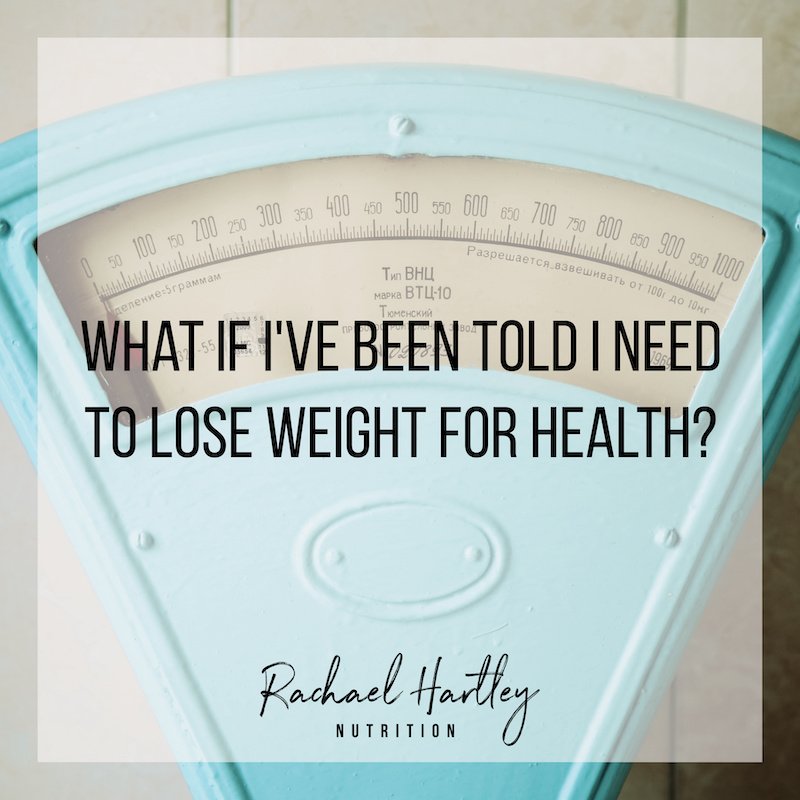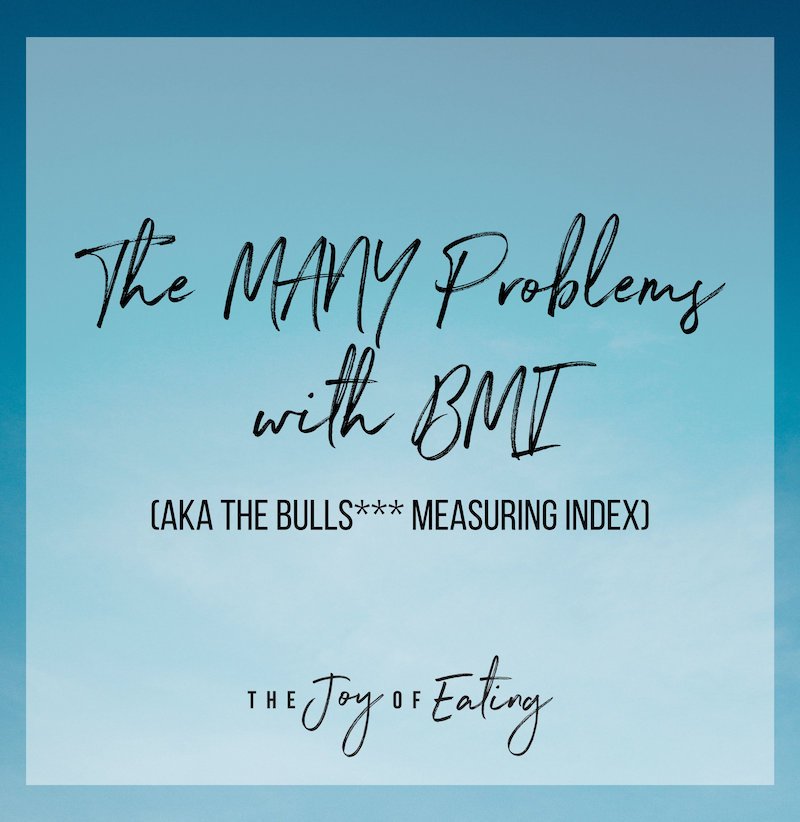What if I Have to Lose Weight for Health?
There’s a lot of people who connect with the body positivity movement, but wonder what to do if they’ve been told they have to lose weight for health reasons. If that’s you, read this article for some things to think about in deciding how to care for your body.
There are many different reasons why someone might want to lose weight. Most people assume aesthetics is the main motivation for people who are dieting. In my experience, while it is a major one, it is often much more complex than a “shallow” desire to be thinner. We live in a deeply fatphobic culture that puts pressure on humans to try and shrink their bodies from a lot of different angles.
In my practice, I work with quite a few clients who have mostly worked past their desire to look thinner. They are often in happy, long term relationships, have solid friendships, and fulfilling careers and/or family lives. They know from experience that society’s message that you have to be thin to be happy is not accurate. They know that changing their appearance would not change their life, and they are well informed on diet culture, intuitive eating, and body positivity.
And yet, sometimes they struggle with the desire to lose weight. Almost always, it is due to health concerns. They have been told to lose weight by their doctor, or struggling with a health condition they think may be due to or exacerbated by their body size.
This purpose of this post is not to say whether you should or shouldn’t try to lose weight. We’re big believers in bodily autonomy over here! It’s impossible to know your own unique situation, health history, and relationship with food, and even if I did, it’s still not up to me. That said, I do believe everyone has a right to information in making decisions about their health. If you’re wondering if you should lose weight for health reasons, I hope this blog posts gives you some things to consider in making a well informed decision.
Is your weight really negatively impacting your health?
In mainstream medicine, weight is often treated as if it’s synonymous with health. For people who have a BMI in the “overweight” or “obese” categories, the recommendation to lose weight is thrown out at almost every doctors visit, even for things as clearly non-weight related as a broken bone or the flu. So it makes sense that most people would assume they need to lose weight to for health.
In reality, the relationship between weight and health is far from given. For starters, using BMI to characterize one’s fatness is extremely flawed, so any research examining BMI and health is flawed as well. That said, the research on BMI and health actually paints a different picture. In the best designed study looking at the relationship between BMI and mortality, the category with the lowest rate of mortality was “overweight,” and grade 1 “obesity” (BMI 30-35) was equal to the “normal” weight category. Multiple studies have found the “underweight” category to be at the greatest health risks, and yet people whose BMI falls in that category rarely get a “weight talk” from their doctor. In fact, I’ve had many, many clients who were severely emaciated and underweight, whose anorexia was not diagnosed by their doctor, despite being the rare case of someone who actually looks like the stereotypical image of someone with an eating disorder.
That said, there is a correlation between higher weights and certain health conditions, like type 2 diabetes and heart disease. However, there is quite a bit of research that suggests much of this statistical increase in morbidity and mortality is due to the health effects of weight cycling (i.e. yo-yo dieting), the stress of stigma and oppression, poor health care, and health care avoidance, an understandable reaction when every time you go to your doctor, you’re shamed for your weight. At the end of the day, there is no health condition that affects only people in larger bodies, so to blame a health condition on weight is at best overly simplistic.
Is it possible that your health condition is being exacerbated by your weight. Sure, that’s within the realm of possibility. Is it possible that your health would improve if there was a magic wand that could instantly take pounds off your body? Maybe. Maybe not. However, such a wand does not exist, and weight loss requires behaviors, medications, or surgery that may have it’s own side effects, which brings me to my next point…
What is the health impact of dieting/weight loss?
Weight loss doesn’t happen in a vacuum. One has to create a caloric deficit through diet or exercise, take weight loss medications, or have bariatric surgery. These things come with their own health risks. Even if we knew for certain that weight loss would improve health (and we don’t), it’s hard to weigh that (no pun intended) against the possible, or perhaps likely, health risks of dieting.
Restricting calories, limiting intake, and/or eliminating foods/food groups may lead to weight loss. Usually that weight loss is temporary. It also may lead to nutrient deficiencies, fatigue, disruptions to gut microflora, digestive issues like diarrhea or constipation, loss of muscle mass, lowered bone density, gallbladder disease, hormonal issues (especially with sex hormones), lowered immune function, fluctuations in blood sugar, dehydration and headaches. From a psychological standpoint, dieting can lead to or exacerbate anxiety and depression and cause moodiness (we all know hanger!). Dieting can impact your social life and can lead to social isolation. Weight loss can also trigger a life threatening eating disorder for people who are at risk, and with the exception of people who have a family history, we don’t really have a good way of knowing who is at risk.
Most people realize that really restrictive fad diets, like the grapefruit diet or a detox cleanse, are unhealthy. However, these side effects can occur even if someone is losing weight in a way that seems to be “healthy” on the surface. It can be even more confusing because many diets I would consider to be quite restrictive, like keto or Weight Watchers, are often branded as a “lifestyle.”
This is not to say that all weight loss immediately has negative health consequences. When someone loses weight as a side effect of health-promoting behaviors, it’s usually no big deal. That said, most people will not lose the amount of weight required to bring their weight down in the way BMI charts and doctors are recommending with health-promoting behaviors alone - more restrictive, and more dangerous, means are necessary. I know that may be hard to hear if you live in a bigger body, and I want to send a lot of compassion your way if it’s bringing up big feelings. But I also think it’s worth pointing out that if we didn’t have a medical system that arbitrarily and inaccurately judged ones health based on weight, this information wouldn’t be nearly as painful.
Is sustained weight loss even possible?
There’s a lot of different ways to lose weight, and yet, with all the research that has been done with weight loss interventions, researchers have yet to find a single method that produced significant, sustained weight loss for more than a small number of people. Most diet intervention studies are less than 2 years, and those that go longer show that after 2 years, 1/3rd to 2/3rds of dieters have gained back more weight than they lost on the diet in the first place. It could be argued that dieting is more effective at creating weight gain than weight loss.
This data matches up with a lot of my clients personal experiences. They lose weight, but over time they gain back the weight they’ve lost, and often times more. It makes them feel like a failure, and yet it is the diet, not the person that is failing. They body is doing what it was designed to do - fight back when it is inadequately fed.
Our body is designed to protect us against starvation. Thank goodness, otherwise we as humans wouldn’t be here! While in our modern environment and with our cultural attitudes towards weight, we might not like the fact that our body perceives weight loss as starvation, that doesn’t change the fact that it does.
If you’ve been told you need to lose weight for health, you might be reading this and feeling a bit hopeless. If so, I want to validate that feeling, while also seeing if it’s possible to reframe this information in a more hopeful light? Rather than pursuing weight loss, something that has repeatedly been shown to be ineffective - and is quite stressful! - you can put your energy towards something figuring out ways of taking care of your body that feel good, physically and mentally.
There are many science-backed interventions to improve health outside of weight loss. Here’s a few examples using medical conditions that are commonly blamed on weight:*
Diabetes: aim to include a fat, protein, and carbohydrate at most of your meals, build in regular physical activity, practice meditation or other stress-relieving activities, increase intake of fiber, aim for a good night of sleep.
Knee osteoarthritis: consider physical therapy and/or occupational therapy, try accupuncture, stress management activities, eat moderate amounts of protein throughout the day to help maintain muscle mass, consider increasing intake of fatty fish or taking a fish oil supplement.
Hypertension: reduce alcohol consumption, stress management, engage in regular physical activity, increase intake of potassium-rich foods, like fruits, veggies and dairy.
* Please note that not all of these examples may be helpful or applicable to you - these are simply examples of interventions that have nothing to do with weight loss.
All of this may feel confusing when you look at research (or more accurately, headlines stemming from research) that suggests weight loss improves health. Phew, unpacking that research could be an entire book (Anti-Diet, You Just Need to Lose Weight, and Body Respect all do a pretty good job of that). When I look at the research, one question that always pops up for me is how do we distinguish the effects of weight loss from the effects of behaviors? In these intervention studies, improvements to health markers often happen before someone has lost significant weight, so how are the benefits due to weight loss? Research on liposuction gives us another clue. If fat loss in a vaccumm (which is literally what happens in liposuction lol) improved health, we would see improvements in cholesterol, blood glucose levels, etc from the surgery - but we don't.
At the end of the day, the decision to try and lose weight or not is highly personal. But when weight loss is inaccurately presented as the only path to health, it robs people of their autonomy. It presents them with a single option, and a single option that might cause quite a bit of harm in the process. I hope by learning some of this information, you’re able to open your mind to options to help you live a healthier life, whatever that means to you!
If you feel like you’d benefit from individualized support in discovering how to care for your health from a non-diet approach, reach out! We work with clients virtually throughout the US in person in our Columbia, SC office. Here’s a link with more information about our practice philosophy and services.









